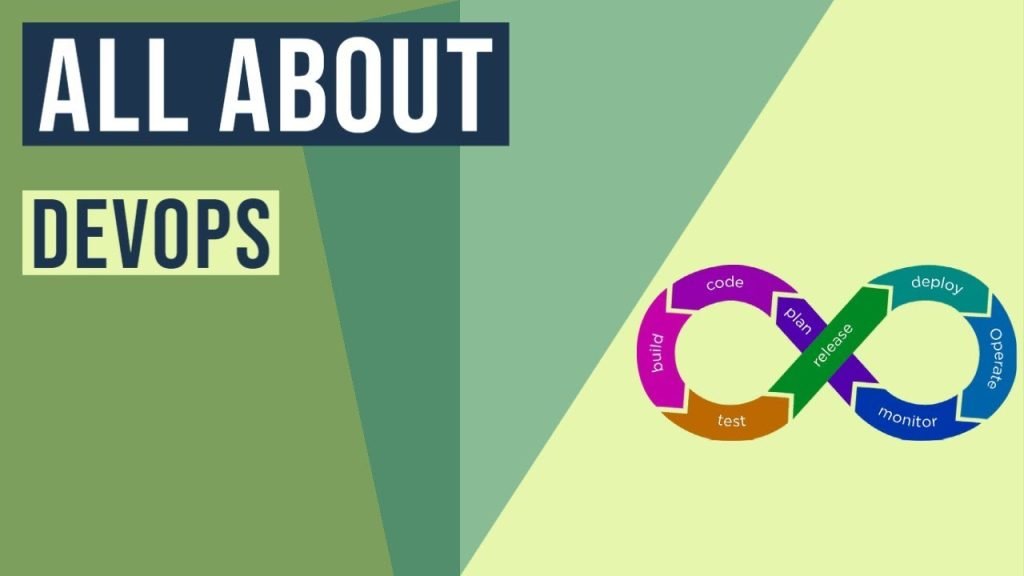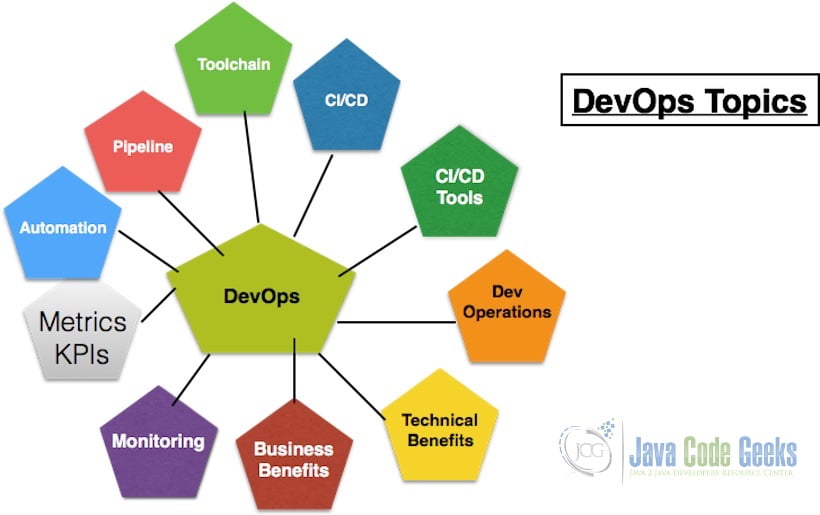DevOps Interview Questions and Answers
In this article, we will take an overview of the most important DevOps interview questions and answers from basics to advance.
Interview questions are very different from online certification exams. In the interview, skills are tested by asking concepts, experiences with tools, scenarios, benefits, issues, and lifecycle related queries.
This article outlines DevOps concepts in detail. The questions which will come in the interview will be related to your experiences with the topic below. The answers need to highlight your personal experience in realizing the concept.
You can also check this tutorial in the following video:
Today we’ll look at interview questions and answers related to:
- CI/CD basics
- Popular CI/CD tools
- Dev Operations
- Technical benefits
- Business benefits
- Monitoring
- DevOps Metrics
- Automation
- Pipeline
- Toolchain
Let’s get started!
Table Of Contents
1. Basic Concepts – CI/CD
1.1 What are the most popular CI/CD tools?
The popular CI/CD (Continuous Integration/Continuous Delivery) tools are Jenkins, Ansible, Nagios, Docker, and Git. Jenkins is used for assembling the code, monitoring the build, deployment tasks during the execution, and pushing the software package to the environment. Ansible is used for deployment automation, software provisioning, app development, cloud provisioning, and intra-service execution. Nagios helps in identifying the issues and fixing them with tools related to server, networking, and monitoring. Docker is used for packaging and deploying applications on distributed systems. Git is a version control system used for software code versioning and tracking the project development.
The other CI/CD tools are Gradle, Raygun, Puppet, and Phantom. Gradle has features related to advanced caching, compilation avoidance, and build automation. Raygun helps in identifying defects and performance problems. Puppet helps in cutting down the control and providing simple configuration. It has declarative language for configuration management. Phantom is used for risk reduction. Risk reduction is achieved using File detonation and device quarantine.
1.2 What are CI/CD – Features ?
The typical features of a CI/CD tool are:
- build automation
- integration testing
- source code control
- version control
- deployment automation
- reporting
1.3 What are CI/CD – Benefits ?
The benefits from CI/CD tools are quicker development, risk reduction, effective communication, stabilized code, overhead cutdown, flexibility, and build process consistency. The product code is packaged into a deployable unit using build scripts and executing the functional test suite. The deployment happens when the functional test suite has passed all the tests. CI/CD helps in releasing the product with good quality, in time, and meeting customer expectations.
1.4 What does Continuous Testing mean ?
Now, let us look at continuous testing. It is related to automated test suite execution with frequency relevant to the delivery lifecycle. This helps in improving the quality of the software and monitoring the quality very early. It helps in risk reduction, code quality improvement, reliability, consistency, and service virtualization.
1.5 What is Automation Testing ?
Automation testing is about creating an automation test suite that can execute a set of functional tests. It helps in full coverage of application features, consistency, efficiency, reusability, saving of money, and reliability.
1.6 Mention some Continuous Testing Tools
The tools used for continuous testing are Selenium, Katalon studio, Eggplant, Watir, and Tosca. Continuous tests are created for getting the quick response of the release using the pipelines. The automated tests are executed at the set frequency.
1.7 Explain Continuous Delivery
Continuous delivery and continuous integration go together to have the deployable package ready. It helps in accelerating the product releases and cutting down the risk in change and defect fixing.
1.8 What are Tools used in CI/CD ?
| Process Step | Tools |
| Continuous Development | Git, SVN, Mercurial, CVS, Jira |
| Continuous Integration | Jenkins, Bamboo, Hudson |
| Continuous Delivery | Nexus, Archiva, Tomcat |
| Continuous Deployment | Puppet, Chef, Docker |
| Continuous Monitoring | Splunk, ELK Stack, Nagios |
| Continuous Testing | Selenium, Katalon Studio |
2. DevOps Interview Questions – Basics
2.1 What are the DevOps principles?
The DevOps key principles are continuous deployment, infrastructure as a code, automation, monitoring, and security. The other principles are customer-centric action, end to end responsibility, continuous improvement, automation, team effectiveness, robust monitoring, and test coverage.
2.2 What are DevOps Prerequisites?
DevOps prerequisites are test automation, version control system, deployment automation, and effective communication.
2.3 Mention different Dev Operations
The Dev operations during the development of the application are building, unit testing, packaging, deployment, and covering various features while testing. Infrastructural operations are provisioning, configuring, orchestrating, and deploying the software packages.
2.4 What are Devops Components ?
The key components of a DevOps tool are continuous integration, testing, delivery, and monitoring. The other components are automated delivery pipeline, configuration management, health checks, and infrastructure as Code.
2.5 Mention some Technical Benefits of using DevOps
The technical benefits of the DevOps tool are quicker defect resolution, frequent software releases, and reduction in complexity of the issues.DevOps helps in predictability, reproducibility, maintainability, quality improvement, risk reduction, and resiliency.
2.6 What are the Business Benefits of using Devops ?
The business benefits of the DevOps tool are the quicker release of features, higher customer satisfaction, the higher chance of delivering more value, and stable environments.
3. Devops Implementation
3.1 Explain Auto deployment
Auto deployment helps in deploying the application when there is a change in the application code. It can be used during development. This feature can be executed using a build script or in an admin console.
3.2 What are Containers?
Containers help in binding the application and its software environment. They help in executing the application on any operating system. The goal of containerization is close to the gap between operations and the development team. The developer environment can be made similar to the deployment environment using the container. They help in streamlining the deployment, testing, redeployment, and setting up the environment. The benefits of the containers are overhead reduction, productivity increase, operational consistency, higher efficiency, and smoother application deployment.
3.3 What is Configuration management?
Configuration management helps in controlling the development and deployment process. Different components related to networking, storage, servers, and software are configured using the configuration management tools. Different configuration management tools are Chef, Ansible, Puppet, CFEngine, and Saltstack.
3.4 Explain Infrastructure As a Code
Infrastructure As a Code is related to IT provisioning and managing the infrastructure. The infrastructure consists of networks, databases, connection topology, and other elements. These elements are managed by using scripts instead of configuration software or by human resources. This automates the deployment process in the environment and enhances consistency, reliability, and efficiency.
3.5 What is Version Management ?
Software version management is the software used for managing the code changes and checking into the storage system. This software helps in managing the versions and comparing the versions. It is used for managing the code for different environments.
3.6 Mention DevOps Workflow Features
DevOps workflow consists of version control, continuous integration, continuous delivery, and continuous deployment. Version control is managing different versions of the code. Continuous integration is related to compiling, validating, building, unit testing, and integration testing. Continuous delivery is automating the software release and testing process. This helps in faster delivery of the releases. Continuous deployment is deploying the software package on to the environment using automation scripts.
4. Advanced DevOps Interview Questions
4.1 Explain DevOps Automation
DevOps Automation tools are Nagios, OpenNMS, Splunk, Icinga 2, and Wireshark. These tools help in executing tasks with lesser human assistance. They provide a response and improve communication between development and operation teams. Quicker releases can be deployed in the environment because of effective communication.
4.2 What are DevOps Metrics ?
DevOps Key Metrics are deployment frequency, failed deployment percentage, and MTTR (mean time to failure recovery). The other metrics are changing volume, deployment time, lead time, customer tickets, automated test pass percentage, defect escape rate, availability, service level agreements, failed deployments, error rates, application usage, application traffic, and MTTD (mean time to detection).
4.3 What is DevOps Pipeline?
DevOps pipeline consists of the processes which are related to automation of compiling, building, deploying, and testing the software. The pipeline can also have continuous monitoring, continuous feedback, and continuous operations.
4.4 What are DevOps Features?
DevOps Tools features are dashboard, repositories, pipelines, test plans, and artifacts. DevOps Lifecycle consists of the development, testing, integration, deployment, and monitoring phases. The other areas covered by the DevOps tools are iterative releases, incremental releases, team collaboration, and test automation.
4.5 What is DevOps Toolchain?
A DevOps toolchain has tools to automate the development and deployment tasks. A toolchain can have backlog tracing, delivery pipeline, and other tools. Toolchain helps in cutting down the complexity of automation. Toolchain is used for quicker deployments, incident management, and quality assurance.
5. Summary
DevOps tools have become popular as they have proved to be successful in delivering value for businesses. Agile and DevOps helps in the continuous delivery and deployment of software without any stoppage of operations.
DevOps tools are selected for large distributed applications deployed on the cloud. It is not recommended in scenarios where strict access controls need to be imposed on the environment (bank, finance, utility). The access controls might be associated with change management, file access, and data access.
DevOps engineer is a very common position in a typical agile project team. DevOps engineer works with the system admin, programmer, IT staff, and cloud administrators. DevOps is helping enterprises to cut down the release cycles from quarters to months and in some cases, to weeks.
You can find more Interview Questions and Answers from Java Code Geeks here.
6. Conclusion
In this article, we have seen some of the DevOps interview questions.
Ok, so now you are ready for your interview! Don’t forget to check our Examples dedicated subsection!
If you enjoyed this, then subscribe to our newsletter to enjoy weekly updates and complimentary whitepapers! Also, check out our courses for more advanced training!
You are welcome to contribute with your comments and we will include them in the article!




